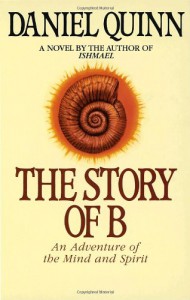Ishmael He is Not

When I read Daniel Quinn’s Ishmael I was given a clear view of the importance of human beings reconnecting with the idea that they are apart of nature and need to find a balance with the world rather than trying to dominate it. It was a well written book with a easy to grasp message. One I happen to agree with. Because of my enjoyment in reading Ishmael I decided to read more of Quinn’s work. I went next to The Story of B: An Adventure of the Mind and Spirit. What I found in this book was along the same lines, but less clear and at times slightly ridiculous.
This adventure of mind and spirit follows the main character Father Jared Osborne into Germany where he is assigned the task of meeting a man who might be the anti-Christ, B. Jared belongs to a group of Catholics known as the Laurentians and his superior is very concerned with finding the anti-Christ. Jared’s order believes that this public speaker, B, who is spreading his message in German pubs and basements is that anti-Christ. Jared is sent to determine if that is true. He meets B and through many conversations comes to see B’s point as well as why he might be viewed as an anti-Christ of sorts. I won’t give away what happens, I don’t like spoiling books, but Jared does go through quite a bit of a shift in his world view.
I had problems with this work that I didn’t have with Ishmael. The Story of B is written in diary form, like Ishmael was, from the perspective of Jared. However, while Ishmael was a series of interesting conversations, this books ends up somewhat like lecture notes, with ridiculous plot twists in between entires. Jared writes about meeting with B and some of the conversations that they have, but he also talks about attending B’s lectures. Quinn does not have Jared write them down in the chapters though, they are to be found in the back of the book within a section called The Teachings of B. This means that the reader has to choose between interrupting the story to flip to the back of the book and read B’s lecture, or wait until the end of the book and read them together. This is a bad idea, as B maps out his point of view for Jared throughout the story, so reading the back section is redundant.
The ridiculous plot twists I mention do not add to the story. Without giving too much away I can say that people want B dead over what he is saying in the basements of rundown German businesses and they make attempts to achieve that goal. When the reader begins to understand what B’s messages is, which is a little ridiculous itself, it is hard to believe someone would kill over this. B does accuse all of the world’s major religious as being moral corrupt. He says that they have all had a hand in helping to keep people in the dark about their true natural freedoms. This is what makes him the anti-Christ for Jared’s superior. The religious have killed over less, but it still seems a far stretch in this story.
B’s messages, rather Quinn’s message, is not that understandable. Much of what he writes about is the Great Forgetting, which is explained as humans forgetting that they were once hunter-gathers. Ishmael is mentioned in the story as well, it seems B was his student. Take this into account and the message B is communicating is the same as Ishmael was, live in better balance with the planet, or die. However, Quinn talks about the agricultural revolution as being a mistake, as the moment when the Great Forgetting occurred and that led us into becoming a Taker society. Taker meaning, exploiter of the planet. Quinn writes, through B, about the virtues of hunter-gather society, but doesn’t explain clearly what he means for the reader to do with this information. For example, Quinn spends a great deal talking about how humans used to be able to read the land, seeing tracks in the dirt and understanding what had happened there. This can be interpreted as ancient humans having a deeper connection to nature than we do now, but it could also mean Quinn wants us to hunt. The glorifying of hunter-gather culture over agrarian society doesn’t communicate very well how modern people are supposed to live. We can’t go back to picking berries and running down wild pigs.
I found it very hard to lose myself in this book. While Ishmael went by page after fast page, B dragged. Jared was not a very entertaining character and the people he interacted with seemed like new age spiritualists who took their nature worship too seriously. One of the other characters, the second B if you will, is Shirin, a very angry woman who doesn’t like Jared. While some of her life is revealed and therefore her anger makes more sense, she still comes off as an angry Shirley Maclane, who pistol whips defilers of nature with her crystals of wisdom. Quinn’s message is lost in the mud of his characters personalities and the unbelievability of B’s threat to society. I am not sure if Quinn wants me to spend more time outside, sitting in a park, or more time outside hunting and gathering my dinner. Or just more time sitting in dark, filthy basements of German bars. While I still recommend Ishmael, I suggest skipping The Story of B, it is an adventure in futility.




